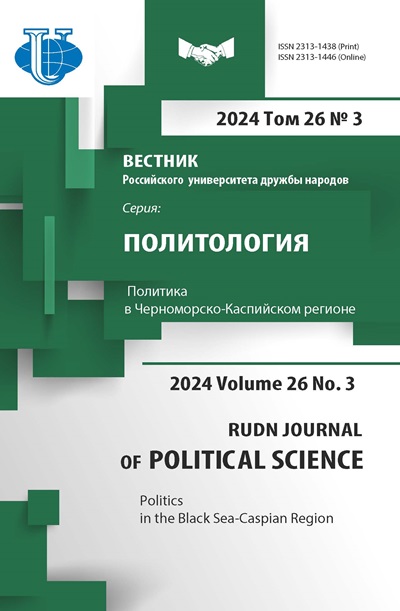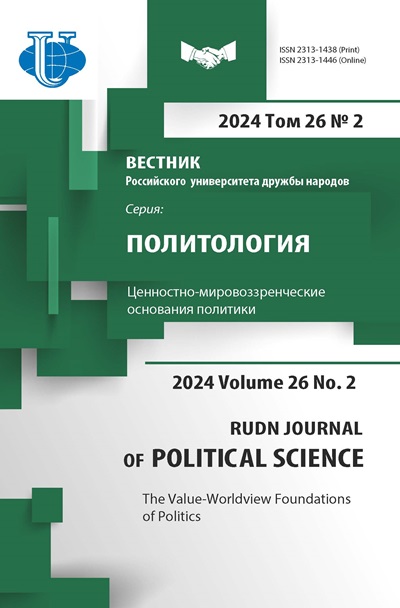A Hundred Thousand “Me” in One “We”: Collective and Individual in the Russian Youth Worldview
- Authors: Selezneva A.V.1, Tulegenova D.D.1,2
-
Affiliations:
- Lomonosov Moscow State University
- Institute of Scientific Information for Social Sciences of the Russian Academy of Sciences
- Issue: Vol 26, No 2 (2024): The Value-Worldview Foundations of Politics
- Pages: 341-356
- Section: YOUTH IN POLITICAL PROCESSES: VALUE AND IDEOLOGICAL SELF-DETERMINATION
- URL: https://journals.rudn.ru/political-science/article/view/39759
- DOI: https://doi.org/10.22363/2313-1438-2024-26-2-341-356
- EDN: https://elibrary.ru/MPJWST
Cite item
Full Text
Abstract
Today, the question of the relationship between the collective and the individual in their consciousness and worldview occupies a special place in the study of modern Russian youth. Young people tend to want to separate themselves from society in order to understand their personality and belonging to various social groups, to accept or not accept the values, norms, ideals of the society in which they are located, in general, to understand their place in it. At the same time, our political culture is considered collectivist, oriented towards the ideas and values of conciliarity and solidarity. In this regard, the study was aimed at identifying attitudes and orientations towards the collective and individual in the minds of modern Russian youth. The empirical base of the study was made up of data from the All-Russian representative survey of citizens aged 14-30 years ( n = 2,500) conducted in the fall of 2022. The qualitative part of the study is presented by the materials of 8 focus groups conducted in the fall of 2023, the participants of which were young people aged 14 to 30 years living in all federal districts of Russia. The general conclusion of the study was the results of the study allow us to say that the so-called We-worldview is characteristic of modern Russian youth, which is a complex set of contradictory but interrelated values, ideas, orientations and attitudes towards inclusion in public relations and relationships. Its peculiarity lies in the fact that it simultaneously manifests elements of the collective (solidary, conciliar, communal) and partly individualistic principles that are traditional for the domestic political tradition. Young people retain attitudes towards unification and solidary social relations. At the same time, social groups, society, the state and interaction with them are perceived by young people only through the prism of the “I” as defining the context, conditions and circumstances of their life and creating opportunities for their self-development, self-expression and self-realization.
Keywords
About the authors
Antonina V. Selezneva
Lomonosov Moscow State University
Author for correspondence.
Email: ntonina@mail.ru
ORCID iD: 0000-0003-2500-6356
Doctor of Political Sciences, Associate Professor, Department of Political Sociology and Psychology, Faculty of Political Science
Moscow, Russian FederationDinara D. Tulegenova
Lomonosov Moscow State University; Institute of Scientific Information for Social Sciences of the Russian Academy of Sciences
Email: tulegenova.dinara1998@yandex.ru
ORCID iD: 0000-0003-0566-5688
Researcher at the Institute of Scientific Information for Social Sciences of the Russian Academy of Sciences (INION RAN), Postgraduate, Department of Political Sociology and Psychology, Faculty of Political Science, Lomonosov Moscow State University
Moscow, Russian FederationReferences
- Andreeva, A.S. (2023). Three dimensions of adulthood: Freedom, responsibility, and care. Sociological Studies, 7, 105–116. (In Russian). http://doi.org/10.31857/S013216250023698-0.
- Аsееvа, Т.А., & Shashkova, Ya.Yu. (2021). Perception of patriotism by schoolchildren of the Siberian Federal District. RUDN Journal of Political Science, 23, 1, 118–129. (In Russian).
- Batalov, E. (2008). Human, world, politics. Moscow. Academic Educational Forum on International Relations «International Trends». (In Russian).
- Chernysh, Yu.A. (2015). On formation of culture of solidarity in the Russian society. Almanac of Modern Science and Education, (6), 154–156. (In Russian).
- Egorov, V. (2014). Societal grounds Russian political modernization. Observer, (7), 24–27. (In Russian).
- Evgenyeva, T.V. (2022). The influence of the socio-political identification of modern youth onnotionsofmoralvaluesandnorms. Humanitiesand Social Sciences. Bulletinofthe Financial University, 12(2), 84–90. (In Russian). http://doi.org/10.26794/2226-7867-2022-12-2-84-90.
- Evgenyeva, T.V., Selezneva, A.V., Skipin, N.S., & Tulegenova, D.D. (2023). Request for paternalism: The concept and value of state in the minds of Russian youth. RUDN Journal of Political Science, 25, 1, 233–251. (In Russian).
- Hofstede, G., Hofstede, G.J., & Minkov, M. (2010). Cultures and Organizations: Software of the Mind. Revised and expanded third edition. New York.
- Kasamara, V., Maximenkova, M., & Sorokina, A. (2020). Russian students’ perceptions of justice. Social Sciences and Contemporary World, 4, 20–30. (In Russian). http://doi.org/10.31857/S086904990010748-4.
- Kudrina, Yu., Pechenkin, N., & Kosareva, A. (2022). Political participation of youth in the State Duma elections in 2021: Value attitudes, electoral preferences and political behavior. Humanities and Social Sciences. Bulletin of the Financial University, 12(3), 142–150. (In Russian).
- Kuznetsov, I. (2021). Political consciousness of Russian students: Public solidarity, trust, interaction. Tomsk State University Journal of Philosophy, Sociology and Political Science, 59, 237–252. (In Russian). http://doi.org/10.17223/1998863X/59/22.
- Mareeva, S.V. (2018). Russian youth: Specifics of identities and values. In Handbook of the Sociology of Youth in BRICS Countries (pp. 233–252). Singapore: World Scientific Publishing Co. Pte Ltd.
- Parma, R.V. (2021). Public activism of Russian citizens in offline and online spaces. Monitoring of Public Opinion: Economic and Social Changes, (6), 145–170. (In Russian). http://doi.org/10.14515/monitoring.2021.6.2042.
- Perevezentsev, S.V., & Ananiev, D.A. (2023). Axiological foundations of Russian statehood: “Truth” and ‘justice” in the domestic ideological and political discourse. RUDN Journal of Political Science, (1), 21–37. (In Russian). http://doi.org/10.22363/2313-1438-2023-25-1-21-37.
- Perevezentsev, S.V., Puchnina, O.E., Strakhov, A.B., & Shakirova, A.A. (2021). On the question of methodological principles of studying Russian basic traditional values. Moscow State University Bulletin. Series 18. Sociology and Political Science, 27(4), 113–133. (In Russian). http://doi.org/10.24290/1029-3736-2021-27-4-113-133.
- Piskorskaya, S.Y. (2006). Socio-philosophical analysis of the concept of “Сollectivism” and its connection with the “Russian Idea”. The Bulletin of KrasGAU, (11), 277–280. (In Russian).
- Pushkareva, G.V., Kuznetsov, I.I., & Batovrina, E.V. (2021). Specifics of Russian students inclusion into the social solidarity relationships. Sociological Studies, (10), 125–131. (In Russian). http://doi.org/10.31857/S013216250012813-7.
- Sedaev, P.V., Ustinkin, S.V., & Kochkurov, A.S. (2022). Traditional values of conciliarity and sovereignty as one of the foundations of the formation of Russian statehood. Vlast’, (4), 43–46. (In Russian). http://doi.org/10.31171/vlast.v30i4.9122.
- Selezneva, A.V. (2024). Political values of Russian youth: Traditional meanings in modern conditions. Tomsk State University Journal of Philosophy Sociology and Political Science, (77), 275–279. (In Russian). http://doi.org/10.17223/1998863Х/77/23.
- Selezneva, A.V. (2022). Russian youth: Political and psychological portrait against the background of the epoch. Moscow: Akvilon. (In Russian).
- Selezneva, A.V., & Antonov, D.E. (2020). The value bases of the civic consciousness of the Russian youth. Tomsk State University Journal of Philosophy Sociology and Political Science, (58), 227–241. (In Russian).
- Selezneva, A.V., & Popova, S.Yu. (2021). Socio-political and civil activity of young people: Between massification and individualization. Izvestiya of Saratov University. New Series. Series: Educational Acmeology. Developmental Psychology, 10(1), 12–22. (In Russian).
- Sergeev, V.M. (2012). Historical origins of Russian political culture. Polis. Political Studies, (4), 8–22. (In Russian).
- Shabrov, O.F. (2011). Spiritual foundations of Russian politics. Open Education, (2), 155–158. (In Russian).
- Tsygankov, A.P. (2012). Russian values and foreign policy. Moscow State University Bulletin. Series 12. Political Science, (3), 93–96. (In Russian).
- Turkov, E.A. (2021). Paternalistic orientations of Russian students: political and psychological analysis. Polylogos, 5(3), Retrieved March 13, 2024, from https://polylogos-journal.ru/ s258770110017317-0-1/ (In Russian).
- Ushkin, S.G., Koval, E.A., & Zhadunova, N.V. (2020). From theoretical design to practical viewpoints: Implementation of ethical principles in youth life strategies. Monitoring of Public Opinion: Economic and Social Changes, (3), 66–93. (In Russian).
- Voitenko, V.P., Sokolov, V.A., & Lubsky, R.A. (2019). Collectivism and individualism in Russia as a subject of theoretical reflection. Philosophy of Law, (3), 71–77. (In Russian).
- Zubok, Yu.A., & Chuprov, V.I. (2020). Youth in the cultural space: Self-regulation of life activity. Moscow: Norma. (In Russian).
















